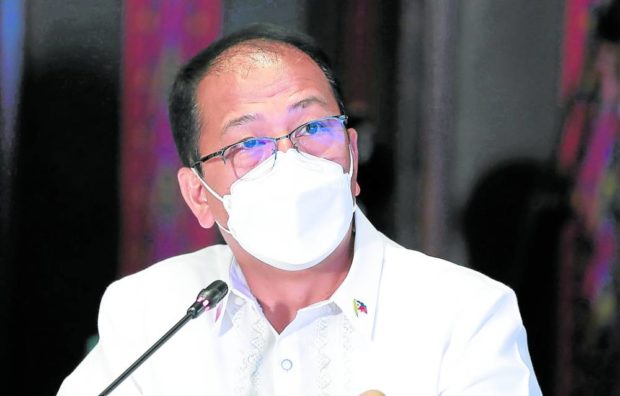Low vax coverage in BARMM poses‘ biggest problem’

Secretary Carlito Galvez Jr. (FILE PHOTO FROM MALACAÑANG)
MANILA, Philippines — Special vaccination days will be held in May in the Bangsamoro Autonomous Region in Muslim Mindanao (BARMM) as the national vaccination program shifts focus to areas with low inoculation coverage.
According to Secretary Carlito Galvez Jr., the chief implementer of the National Task Force Against COVID-19, the government aims to inoculate 215,776 individuals in the BARMM, or about 60 percent of some 1.5 million unvaccinated residents.
The low vaccination coverage in the region is the program’s “biggest problem,” Galvez said during President Rodrigo Duterte’s “Talk to the People” on Tuesday night.
Seventy-one barangays and towns in the provinces of Basilan, Lanao del Sur, Maguindanao, Sulu and Tawi-Tawi will be covered in the special vaccination drive. In Maguindanao alone, the province with the biggest population, about 70,000 individuals are targeted for jabbing.
Government data show that the BARMM continues to lag behind among regions, with only 27 percent of its target population fully vaccinated. Those who have received booster shots are only at 2.2 percent.
Health officials in the region admit that it is vulnerable to a possible surge in coronavirus infections.
“With our low vaccination coverage, we don’t have the necessary protection … especially against the dreaded effects of COVID-19,” said Dr. Amirel Usman, director-general of the BARMM Ministry of Health (MOH).
Usman said the risk was being compounded by “superspreader events that are going on around us, brought about by politicians’ election campaigns.”
The inoculation drive in the region is hobbled by the residents’ hesitancy and outright refusal.
Some of the issues raised are the supposed doubtful efficacy of vaccines against the coronavirus, the alleged “deadly” side effects, and religious beliefs, such as that vaccinations nullify fasting or are not halal (permitted under Islamic law).
In the holy month of Ramadan, which began on April 3, Muslims fast from just before sunrise to sundown as a religious obligation.
Mosques as vax sites
The latest vaccination drive comes as the government races against time to inoculate more Filipinos before the expiration of some 27 million COVID-19 shots.
Using mosques as vaccination sites are among the strategies expected to widen coverage in the BARMM, Galvez said.
“I spoke with the chief minister and told him that we should work together in this vaccination campaign. He said that mosques and masjids may be used as vaccination sites every Friday during their worship day,” Galvez said, referring to interim BARMM Chief Minister Ahod Balawag Ebrahim.
Other strategies include the use of funds and resources for data encoders and vaccination teams as well as for “social preparation,” which, Galvez said, entailed information and education drives.
The single-dose Janssen (Johnson & Johnson) vaccine will also be administered especially in remote areas.
The Department of Health (DOH) had said that “social mobilizers” would be hired to map out communities and identify specific challenges.
Some 66.2 million Filipinos have been fully vaccinated, and 12.2 million have received booster shots, according to the latest DOH data.
Ramping up the effort
Vaccine hesitancy is being addressed by authorities, including the Bangsamoro Darul-Ifta, the BARMM’s Islamic Advisory Council, through a series of information drives.
Dr. Zul Qarneyn Abas, BARMM health minister, on Wednesday said other agencies were being mobilized to ramp up the vaccination effort.
Abas said the MOH had met with officials of the Ministries of the Interior and Local Government, of Social Services and Development, and of Basic, Higher, and Technical Education to discuss modes of collaboration.
Earlier, he said vaccination would continue even during Ramadan although with adjustments, such as the administration of shots only in the morning.
Abas reminded BARMM residents that getting jabbed was safe and provided the best protection against COVID-19.
For the special vaccination days, Usman said, “our manpower and logistics will be focused on the low-coverage areas,” or those geographically isolated and disadvantaged.
He said health workers would take the campaign from house-to-house and in convergence areas like the public market.
“We are planning to do vaccination in our mosque, but we still need to get the approval of our religious leaders,” Usman said.
WHO warning
In Lanao del Sur, health workers conducted “Toktok Bakuna” rounds to increase the vaccination coverage. But complacency has set in among the residents, especially when the number of new infections dropped.
Galvez said the World Health Organization (WHO) had sounded “an alarm and warning” on the low vaccination coverage in the BARMM.
“The WHO and the DOH are afraid that we might have a mini-surge in the BARMM because of the very low coverage,” he told the President.
Galvez traced the roots of the problem to “demand issues” and “vaccine preferences.”
He said Health Undersecretary Myrna Cabotaje had reported that fake news and misinformation on social media by “antivaxxers” were causing vaccine hesitancy among BARMM residents.
For areas where there is a great demand for vaccines, the government is also experiencing logistical problems, Galvez said.
He said bigger boats that could fare better on rough seas were needed to reach faraway islands in the Sulu Archipelago.
—WITH A REPORT FROM RYAN D. ROSAURO
RELATED STORIES
Galvez: ‘Mini’ COVID-19 surge possible in BARMM due to low vax turnout
Only 25% of residents in BARMM fully vaccinated vs COVID-19 — DOH
For more news about the novel coronavirus click here.
What you need to know about Coronavirus.
For more information on COVID-19, call the DOH Hotline: (02) 86517800 local 1149/1150.
The Inquirer Foundation supports our healthcare frontliners and is still accepting cash donations to be deposited at Banco de Oro (BDO) current account #007960018860 or donate through PayMaya using this link.